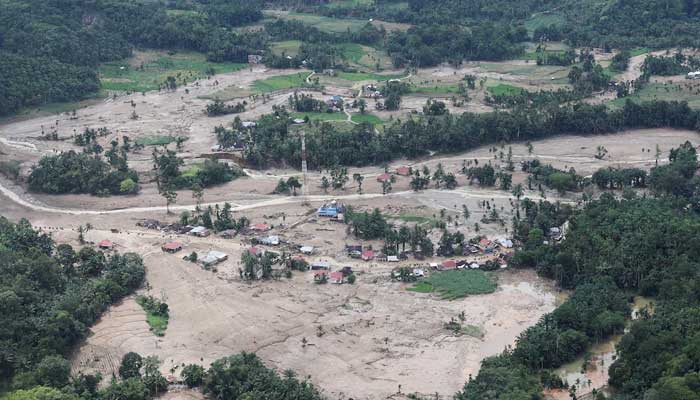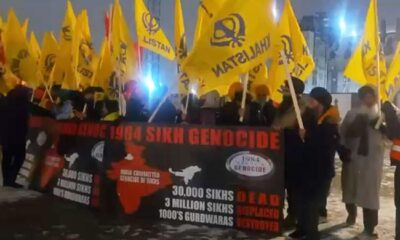Politics
Trump again claims tariff threats ended Pakistan-India war


United States President Donald Trump once again claimed credit on Tuesday for ending the conflict between India and Pakistan, saying that his threat of extremely high tariffs was instrumental in reaching a ceasefire agreement.
Participating in a cabinet meeting at the White House yesterday, the US president reiterated the claim that his intervention was directly responsible for the end of the conflict.
“India and Pakistan were gonna end up in a nuclear war if I didn’t stop them,” he said, adding, “I saw seven jets were shot down … $150 million planes were shot down; seven, maybe more than that, they didn’t even report the real number.”
Trump added that he had spoken to both India and Pakistan at the time of the conflict, asking them what was going on between them.
“The hatred was tremendous,” he said, saying that the conflict had been going on, “sometimes with different names”, for hundreds of years.
Without specifying whether he had been speaking to India or Pakistan, the president said that he had refused to make a trade deal if the two countries ended up in a nuclear war, which had proven pivotal.
“I said, ‘Call me back tomorrow, but we’re not gonna do any deals with you,’” Trump said, “‘Or … we’re gonna put tariffs on you so high, I don’t give a damn, your head’s gonna spin. You’re not gonna end up in a war.’ Within about five hours, it was done.”
Alluding to the possibility that the conflict could begin again, he said, “I don’t think so, but I’ll stop it if it does. We can’t let these things happen.”
Trump has repeatedly claimed credit for ending the war between India and Pakistan, while also regularly threatening steep tariffs on countries that — including hiking tariffs on India to 50 per cent for continuing to buy Russian crude oil, a move that took effect today.
India has denied the claim that the US president was responsible for brokering the ceasefire via trade threats. India has publicly expressed frustration over what it sees as the Trump administration’s increasing tendency to insert itself into India-Pakistan affairs.
Pakistan, meanwhile, hailed the move, with Prime Minister Shehbaz Sharif praising Trump for his “leadership and proactive role” in helping Pakistan and India achieve peace in the region.
Politics
Tajikistan says five Chinese nationals killed in cross-border attacks from Afghanistan in past week


- China advises companies, personnel to evacuate border area.
- Embassy says Chinese citizens targeted in armed attack on Sunday.
- Another border attack on Friday killed three citizens: embassy.
Five Chinese nationals have been killed and five more injured in Tajikistan in attacks launched from neighbouring Afghanistan over the past week, Tajik authorities and China’s embassy in the Central Asian country said on Monday.
China’s embassy in Dushanbe, the capital, advised Chinese companies and personnel to urgently evacuate the border area.
It said that Chinese citizens had been targeted in an armed attack close to the Afghan border on Sunday. On Friday, it said that another border attack — which Tajik authorities said had involved drones dropping grenades — had killed three Chinese citizens.
Tajikistan, a mountainous former Soviet republic of around 11 million people with a secular government, has tense relations with the Taliban authorities in Afghanistan. It has previously warned of drug smugglers and illicit gold miners working along the remote frontier.
China, which also has a remote, mountainous border with Tajikistan, is a major investor in the country.
There was no immediate response on Monday from the authorities in Afghanistan to the Tajik statement.
But Afghanistan’s foreign ministry last week blamed an unnamed group, which it said was out to create instability, and said it would cooperate with Tajik authorities.
Tajik President Emomali Rahmon’s press service said on Monday that Rahmon had met with the heads of his security agencies to discuss how to strengthen border security.
It said that Rahmon “strongly condemned the illegal and provocative actions of Afghan citizens and ordered that effective measures be taken to resolve the problem and prevent a recurrence of such incidents.”
Tajikistan endured a brutal civil war in the 1990s after independence from Moscow, during which Rahmon initially rose to power. The country is closely aligned with Russia, which maintains a military base there.
Millions of Tajiks, a Persian-speaking nation, live across the border in Afghanistan, with Tajikistan historically having backed Afghan Tajiks opposed to the Taliban.
Politics
Indian man kills wife, takes selfie with dead body


A man in India’s south brutally killed his estranged wife at a women’s hostel and took a selfie with her dead body, according to NDTV.
The victim, identified as Sripriya, employed at a private firm in Coimbatore, Tamil Nadu, had separated from her husband, Balamurugam, who was from Tirunelveli.
Police said the suspect arrived at the hostel on Sunday afternoon, concealing a sickle in his clothes, and was seeking to meet her.
They had an argument soon after the couple met, and the feud turned into a violent attack by Balamurugan, who drew the sickle and hacked the woman to death.
Furthermore, the police said he then took a selfie with her body and shared it on his WhatsApp status, accusing her of “betrayal”.
The incident spread panic and chaos in the hostel.
Following the brutal murder, the suspect did not escape from the spot but waited until the police arrived, and he was arrested at the crime scene. The murder weapon was recovered.
The initial investigation suggested that he suspected his wife of being in a relationship with another man.
Politics
Southeast Asia storm deaths near 700 as scale of disaster revealed


- Indonesia, Malaysia and Thailand witness large scale devastation.
- At least 176 people perish in Thailand and three in Malaysia.
- Indonesia’s death toll reaches 502 with 508 more still missing.
PALEMBAYAN: Rescue teams in western Indonesia were battling on Monday to clear roads cut off by cyclone-induced landslides and floods, as improved weather revealed more of the scale of a disaster that has killed close to 700 people in Southeast Asia.
Indonesia, Malaysia and Thailand have seen large scale devastation after a rare tropical storm formed in the Malacca Strait, fuelling torrential rains and wind gusts for a week that hampered efforts to reach people stranded by mudslides and high floodwaters.
At least 176 have been killed in Thailand and three in Malaysia, while the death toll climbed to 502 in Indonesia on Monday with 508 missing, according to official figures.
Under sunshine and clear blue skies in the town of Palembayan in Indonesia’s West Sumatra, hundreds of people were clearing mud, trees and wreckage from roads as some residents tried to salvage valuable items like documents and motorcycles from their damaged homes.

Men in camouflage outfits sifted through piles of mangled poles, concrete and sheet metal roofing as pickup trucks packed with people drove around looking for missing family members and handing out water to people, some trudging through knee-deep mud.
Months of adverse, deadly weather
The government’s recovery efforts include restoring roads, bridges and telecommunication services.
More than 28,000 homes have been damaged in Indonesia and 1.4 million people affected, according to the disaster agency.
Indonesian President Prabowo Subianto visited the three affected provinces on Monday and praised residents for their spirit in the face of what he called a catastrophe.
“There are roads that are still cut off, but we’re doing everything we can to overcome difficulties,” he said in North Sumatra.
“We face this disaster with resilience and solidarity. Our nation is strong right now, able to overcome this.”
The devastation in the three countries follows months of adverse and deadly weather in Southeast Asia, including typhoons that have lashed the Philippines and Vietnam and caused frequent and prolonged flooding elsewhere.

Scientists have warned that extreme weather events will become more frequent as a result of global warming.
Marooned for days
In Thailand, the death toll rose slightly to 176 on Monday from flooding in eight southern provinces that affected about three million people and led to a major mobilisation of its military to evacuate critical patients from hospitals and reach people marooned for days by floodwaters.
In the hardest-hit province of Songkhla, where 138 people were killed, the government said 85% of water services had been restored and would be fully operational by Wednesday.
Much of Thailand’s recovery effort is focused on the worst-affected city Hat Yai, a southern trading hub which on November 21 received 335 mm (13 inches) of rain, its highest single-day tally in 300 years, followed by days of unrelenting downpours.
Prime Minister Anutin Charnvirakul has set a timeline of seven days for residents to return to their homes, a government spokesperson said on Monday.
In neighbouring Malaysia, 11,600 people were still in evacuation centres, according to the country’s disaster agency, which said it was still on alert for a second and third wave of flooding.
-

 Sports1 week ago
Sports1 week agoWATCH: Ronaldo scores spectacular bicycle kick
-

 Entertainment1 week ago
Entertainment1 week agoWelcome to Derry’ episode 5 delivers shocking twist
-

 Politics1 week ago
Politics1 week agoWashington and Kyiv Stress Any Peace Deal Must Fully Respect Ukraine’s Sovereignty
-

 Business1 week ago
Business1 week agoKey economic data and trends that will shape Rachel Reeves’ Budget
-

 Politics1 week ago
Politics1 week ago53,000 Sikhs vote in Ottawa Khalistan Referendum amid Carney-Modi trade talks scrutiny
-

 Tech6 days ago
Tech6 days agoWake Up—the Best Black Friday Mattress Sales Are Here
-

 Tech1 day ago
Tech1 day agoGet Your Steps In From Your Home Office With This Walking Pad—On Sale This Week
-

 Fashion1 week ago
Fashion1 week agoCanada’s Lululemon unveils team Canada kit for Milano Cortina 2026






